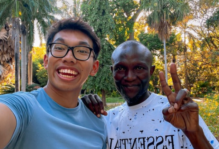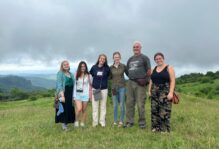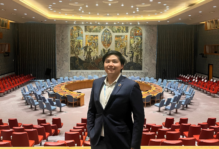Connecting Theory and Practice: How Researchers at the TRIP Project Learn from Experts
This is the fourth installment of a series highlighting exceptional student contributions to the Global Research Institute. Stay tuned for other features throughout April: Undergraduate Research Month.
By Ava Barnes ’23, GRI Communications Assistant
Do you ever wonder what it’s like to hear from leading International Relations professors about the future of the discipline? Morgan Doll ’22 and Nathaly Perez ’22 have the chance to do just that through their roles at GRI’s Teaching, Research & International Policy Project. Recently, the lab has produced insights about scholars’ thoughts on the war in Ukraine, establishing a no-fly zone, the potential for China to Invade Taiwan, and more.
I was able to sit down with Morgan and Nathaly — two members of the TRIP Project’s team — to discuss how the IR discipline can inform contemporary debates. Determining why scholars use certain frameworks to interact with the global environment is one of the lab’s main objectives, Doll said.
“We study international relations scholars and mainly their interactions with different areas — including policymakers, journalists, NGO’s and think tanks,” Doll said. “We’re just trying to kind of understand IR scholars, why they use certain paradigms, and how they engage with the world.”
Some primary responsibilities of TRIP Research Assistants involve helping to create and distribute surveys to journalists, policy scholars, or non-governmental organizations, analyzing survey results, and coding international relations journals. Survey respondents have the chance to provide explanations and evidence that support their assertions about the discipline.
“The TRIP Project primarily surveys our scholars about the world, and we’ll ask different questions about what’s happening now and then from that data we organize it, clean it up, and then put it on the website,” Perez said.
Three primary datasets — the journal article database, collection of faculty surveys, and snap polls — are entirely free to access on the TRIP Project’s site.
Since Doll began at the TRIP Project in 2018, the team has produced and published around ten articles — all focusing on how IR is studied and perceived, and on scholars’ opinions about current events. Earlier this year, TRIP released a snap poll (pdf) detailing scholars’ perspectives on Russia’s invasion of Ukraine, and potential US responses. A near consensus emerged when scholars overwhelmingly opposed the idea of a US-imposed no-fly zone, regardless of academic rank, gender, theoretical framework, regional area of expertise, or subject area of expertise.
Knowing that this work has meaningful outcomes inspires Perez, who describes her role as “a lot of data collection and then cleaning and organizing the data to create general themes.” The themes ensure that the data can be useful for a range of analyses, she said.
“I think it’s a unique experience — what I’ve been able to do with providing data — because it’s my name on the article,” she said. “It’s super cool.”
Interacting with IR professors across the country allows the student researchers to manipulate and interact with the immense amount of data provided by the surveys. The answers are anonymous, so linking ideas together across questions and respondents produces many new interpretations and possibilities, Doll said.
As the TRIP Project bridges the gap between academia and policy, it encourages undergraduate researchers to make real-world contributions. The lab arranged for Doll to present at a Foreign Affairs Journalist and Scholars conference during her sophomore year, allowing her to learn from experts who have engaged with her team’s work.
“It was awesome to get to meet the people whose articles I’ve been reading and just kind of see real life professionals talking about the things that we study at the TRIP Project,” she said. “We had been doing all this data collection the whole year, and then it kind of culminated in that conference.”
Perez said her experience at the TRIP Project has translated into the real world through her post-graduate job search.
“During the whole job application process interviewing, the TRIP Project is always coming up with whatever questions are asked — just because it applies to pretty much everything,” she said.
As the lab continues its work, look out for Nathaly’s upcoming blog post about the authorization of military force. Read past student blogs.




No comments.
Comments are currently closed. Comments are closed on all posts older than one year, and for those in our archive.